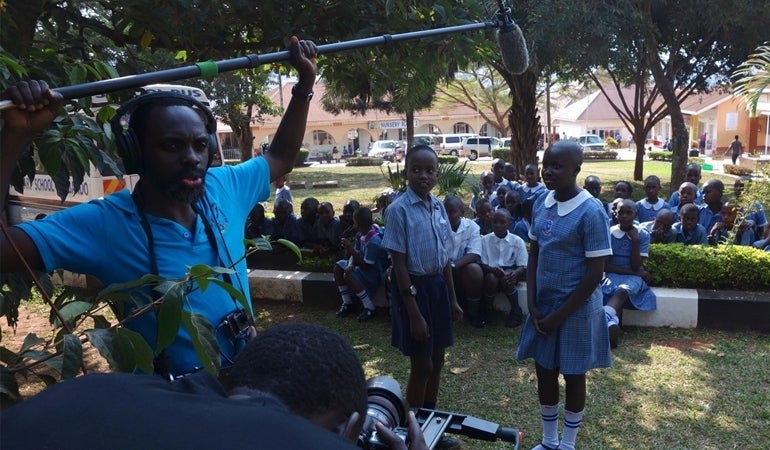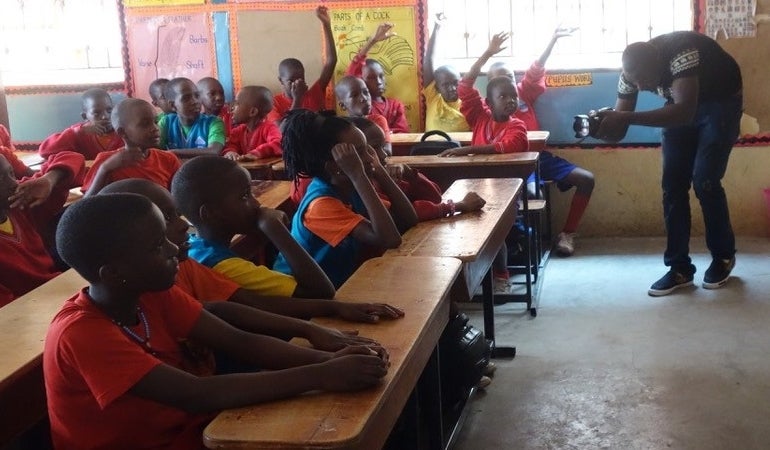Visiting Scholar Howard Blumenthal Launches Kids on Earth Initiative
The aim of the project is to help children from different countries learn about one another’s lives.

Today, 7.5 billion people live on planet Earth, and 1.9 billion — one-quarter of them — are children and teenagers. Approximately half of those young people have internet access, giving them exposure to distant parts of the world and the ability to interact with people from other cultures.
“They are the first connected global generation,” says Howard Blumenthal, a distinguished veteran of public television and a visiting scholar at the Annenberg School for Communication. “We live in an era when a child’s education is shaped by commercial media, social media, life at home, and school — increasingly in that order.”
With that in mind, Blumenthal is launching the Kids on Earth initiative, for children and teenagers ages 8 to 15. This summer, he traveled to Uganda and Hong Kong, recording the first in what he hopes to be many conversations with, and among, kids around the world. The topics: everyday life, home, friendships, families, interests, hopes, and dreams.
The aim of the project is to help children from different countries learn about one another’s lives in a way that erases geographic boundaries, and Blumenthal hopes to create an online presence to allow children throughout the world to see and hear one another.

Through the nonprofit Peripheral Vision International, founded and managed by Annenberg alumnus Paul Falzone (Ph.D. ‘08), Blumenthal was able to connect with four head teachers in Uganda’s capital city, Kampala. They invited him to interview local students in four different schools.
In Hong Kong, Blumenthal partnered with Faust International Youth Theatre, which connected him with local students at the school and their parents.
“Spending time in Uganda and Hong Kong really opened my eyes to the similarities, and the differences, among kids in different parts of the world,” Blumenthal says. “I’m preparing to set up more interviews in other parts of the world, and beginning to work with students, faculty, and nonprofits to arrange interviews that the kids can do on site without the need for travel. It’s all early stages, but we are finding our way. And so far, the responses have been very encouraging.”
Blumenthal is perhaps best known as the creator and producer of Where in the World is Carmen Sandiego?, a children’s game show about geography and world cultures that ran on PBS from 1991 to 1996. It was based on the educational software game of the same name. He is also the author of 25 books on topics ranging from U.S. history to pop culture to marketing and creativity. He has had a long career in the television industry, and as a media executive; most recently, he spent 12 years as the CEO of Independence Media, a public television and internet organization that operated five television channels and several web sites.

While there are apps and websites designed to teach children about the world through trivia or interactive maps, Blumenthal believes that amplifying individual children’s personal stories can be more powerful in encouraging global awareness in children.
Blumenthal is developing connections on the Penn campus, taking advantage of the large number of international students and scholars studying global education in the 21st century world.
Blumenthal fondly remembers corresponding with his childhood pen pal in Japan, and the Kids on Earth project is an effort to modernize this type of relationship. Blumenthal’s ultimate goal is a connected society where children and teenagers can safely and routinely make friends with, study with, and communicate with their peers around the world. He believes public policy will have to change for this vision to come to fruition, emphasizing the importance of safety and agency for children and teens and their online presence.
“For this generation of children and teenagers, the world has already changed,” says Blumenthal. “We are playing catch-up.”



